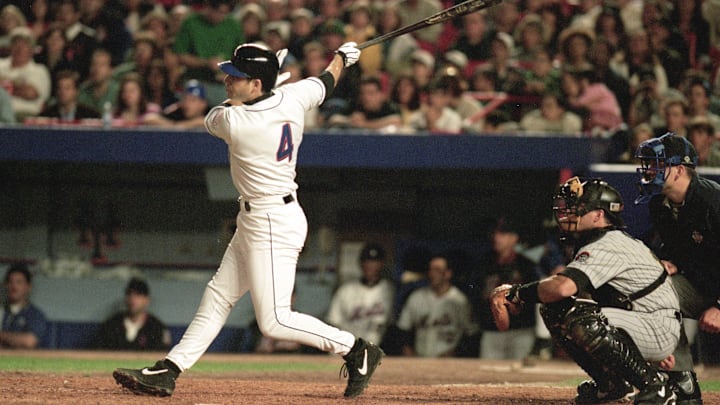In the late 1990s, the New York Mets were transitioning from an organization in a prolonged rebuild to a team with postseason aspirations. The 1998 season served as a turning point, establishing a roster comprised of respectable Major League talent. Still, they fell just short of the Wild Card after their second-straight 88-win campaign under manager, Bobby Valentine. During the following offseason, the Mets made a statement signing free agent Robin Ventura, a former two-time Gold Glove winner with the Chicago White Sox.
Adding Ventura to an already talented crop of players provided New York with a drastic boost in both the batting order and infield while serving as the final piece to transform the Mets into a powerful postseason contender in 1999.
Under general manager Steve Philips, the Mets started to drastically reshape its roster in the mid 1990s. The 1998 season represented the next step towards greatness with the acquisition of superstar catcher Mike Piazza, the formation of a solid pitching staff led by Al Leiter and Rick Reed, and the makings of an elite infield with John Olerud, Edgardo Alfonzo, and Rey Ordonez.
Although this squad once again missed the playoffs, one could argue that keeping this group intact would have been enough to reach the postseason the following year. Still, Phillips and Valentine were no longer in a place where they could let that play out with expectations starting to ramp up in Queens.
At the time of his free agency, the 31-year-old Ventura was viewed as one of the MLB's top defensive third basemen. On top of his elite defense, he was also a solid all-around hitter with power and knack for getting on base. His reputation as a clutch performer also boosted his attractiveness, a trait the Mets would soon come to appreciate even more.
Similar to the re-addition of Pete Alonso to the current Mets, Ventura's insertion into the lineup drastically improved an already potent batting order. He served as a welcome fit between Piazza and Alfonso, two right-handed bats, providing more balance. Additionally, teams looking to compete in the playoffs after extended absences always benefit from those who have been there before. In fairness, Ventura only tasted fall baseball once in his White Sox tenure, making it to Game 6 of the ALCS against the Toronto Blue Jays. Still, his 1,254 regular season games in Chicago gave him the veteran status necessary to provide extra guidance and leadership to a club looking to accomplish greatness.
Robin Ventura's immediate impact on the Mets
In signing Ventura, the Mets were confident he would make a positive impact on the franchise. Still, no one could predict how large that impact would turn out to be. The third baseman wasted little time reassuring the club they made the correct decision bringing him aboard. At age 31, Ventura put together the best offensive campaign of his career. His .301 batting average and 120 RBI would end up both being career-highs, while his 32 home runs would be the second-highest season total, two behind his 1996 mark. To top it off, his .908 OPS was also a career-high, never recording over .900 at any other point in his storied career.
Though offensive production tends to receive most of the accolades and attention, Ventura's defensive contributions to the 1999 Mets resided in the "phenomenal" realm. Along with Olerud, Alfonso, and Ordonez, he assisted in creating one of the most highly-regarded infields in MLB History. Sports Illustrated even deemed it as such in a cover story ran that year.
Of course, none of these accomplishments would have meant anything if the Mets failed to make the playoffs that season. Fortunately for everyone involved, they did, clinching the NL Wild Card and ending a postseason drought that began in 1989. New York would go on to defeat the Arizona Diamondbacks 3-1 in the NLDS before losing to the Atlanta Braves in the NLCS in six games. In the 2000 season, however, they would make it to the World Series before losing to the cross-town rival New York Yankees.
In 1998, the Mets proved they were a team already on the verge of contention. The signing of Ventura put them over the hump the following season, proving that sometimes it only takes one more move to bring a team to the next level.
